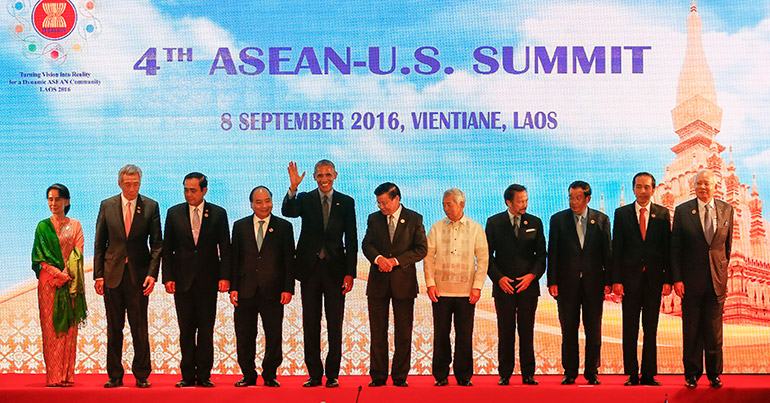Why Asean is the world’s most successful experiment in regional cooperation, according to Kishore Mahbubani, dean of the Lee Kuan Yew School of Public Policy at the National University of Singapore and co-author of The ASEAN Miracle: A Catalyst for Peace

Could you tell me a little bit about The ASEAN Miracle and its main arguments?
The headline that came out of the book is “Asean deserves a Nobel Peace Prize in 2017” – it turns 50 this year. It has taken the most improbable region on planet Earth for regional cooperation and made it one of the most peaceful regions in the world. You look around the world, [and] everybody’s afraid of a clash of civilisations.
Here in Southeast Asia, you have 240 million Muslims, 120 million Christians, 150 million Buddhists, 7 million Hindus, Taoists, Confucianists. And they seem to be able to get along. So, they provide a model for the world on how to handle the new multi-civilisational world that is coming. Frankly, the Asean story is the most undersold story on planet earth. That’s why it deserves the Nobel Peace Prize – people will wake up and see this is amazing.
Why do you think that Asean has worked together when other regions have not?
We put forward a theory based on a few four-letter words. The first four-letter word begins with ‘F’ – it’s called ‘fear’. The reason the Asean countries came together was not out of love, but out of fear, because they were all frightened of the communist expansionism in the 60s and the 70s. The Asean countries were called dominoes by the US secretary of state. So, the dominoes thought the best way to survive was for them to stick together. The Singapore foreign minister S. Rajaratnam said: ‘If we don’t hang together, we will hang apart’.
The second four-letter word is ‘luck’. Asean was lucky that they had very strong leaders, especially in the 1980s, who could work together: Mahathir [Mohamad], Lee Kuan Yew, Suharto. Also, in the 1980s, the other piece of luck was that America, China and Asean worked together to reverse the Vietnamese occupation of Cambodia. That created a very strong degree of regional solidarity as a result of working with America and China.
The third four-letter word begins with ‘G’, and it’s ‘Golf’. The golfing among the Asean officials and ministers created a very strong sense of camaraderie. People laugh when I say that, but that’s true. I played many important games of golf with my Asean colleagues, and resolved many issues on the golf course.
I think many people would find this idea quite contentious, that Asean has succeeded in regional cooperation. What would you say to those who point out that there’s quite a bit of strife and conflict within the region?
Asean is definitely an imperfect organisation. But I would say that now it’s the least imperfect regional organisation in the world. The European Union was always seen as a pillar of stability. And if you had asked me five years ago, ‘Will the EU break apart first or will Asean break apart first?’ I would have said, ‘Of course Asean. Asean is not as strong as the EU.’ But, amazingly, the European Union is breaking apart first before Asean. That is an indication of how resilient Asean is.
Asean doesn’t try to be like the European Union, meddling in everything. Asean cannot solve all the problems. We adopt a very slow, calibrated approach. What we can fix, we try to fix. What we cannot fix, we don’t fix… we cannot fix the Rohingya problem.
But, in our book, I mention something very important. I say there are two countries which had military governments for a long time. One country was taken care of by United States and Europe, and the other was taken care of by Asean. The first country is Syria; the second country is Myanmar. Just compare. The West took care of Syria and destroyed it; we took care of Myanmar and created the most peaceful transition from military rule that you’ve seen in recent times. So, the broader Asean success story on Myanmar is absolutely amazing.
What about the Asean policy of non-interference? How has that contributed to Asean’s success, or diminished it? What would you say to its critics?
The West has tried a policy of interference in Iraq – it has failed. It has tried a policy of interference in Syria – it has failed. It has tried a policy of interference in Libya – it has failed. It has tried a policy of interference in Ukraine – it has failed. So, I think the lesson is that if countries as powerful as [those in] the West have demonstrated that if they interfere in other countries, you create disasters. I think in that sense the policy – there’s an Indian writer called Shyam Saran who says you must apply the morning-after principle. He says: ‘Okay, if you bomb Iraq today, then tomorrow Iraq belongs to you. You take care of it. But if you’re not prepared for the morning-after principle, don’t bomb Iraq’. Today, tell me, how many Americans take responsibility for the invasion of Iraq? That is, I think, the most immoral thing on planet earth. Compared to that, I think Asean’s policy of non-interference is very wise.
What challenges will Asean face moving forward?
The biggest challenge it faces, of course, is geopolitical. There will be rising competition, inevitably, between the US and China in this coming decade. Asean is the organisation that is the most vulnerable to US-China competition, because the worst thing for Asean is being forced to [choose between] two sides.
Does Asean deserve its own Nobel Peace Prize?
Why Asean is the world’s most successful experiment in regional cooperation, according to Kishore Mahbubani, dean of the Lee Kuan Yew School of Public Policy at the National University of Singapore and co-author of The ASEAN Miracle: A Catalyst for Peace

